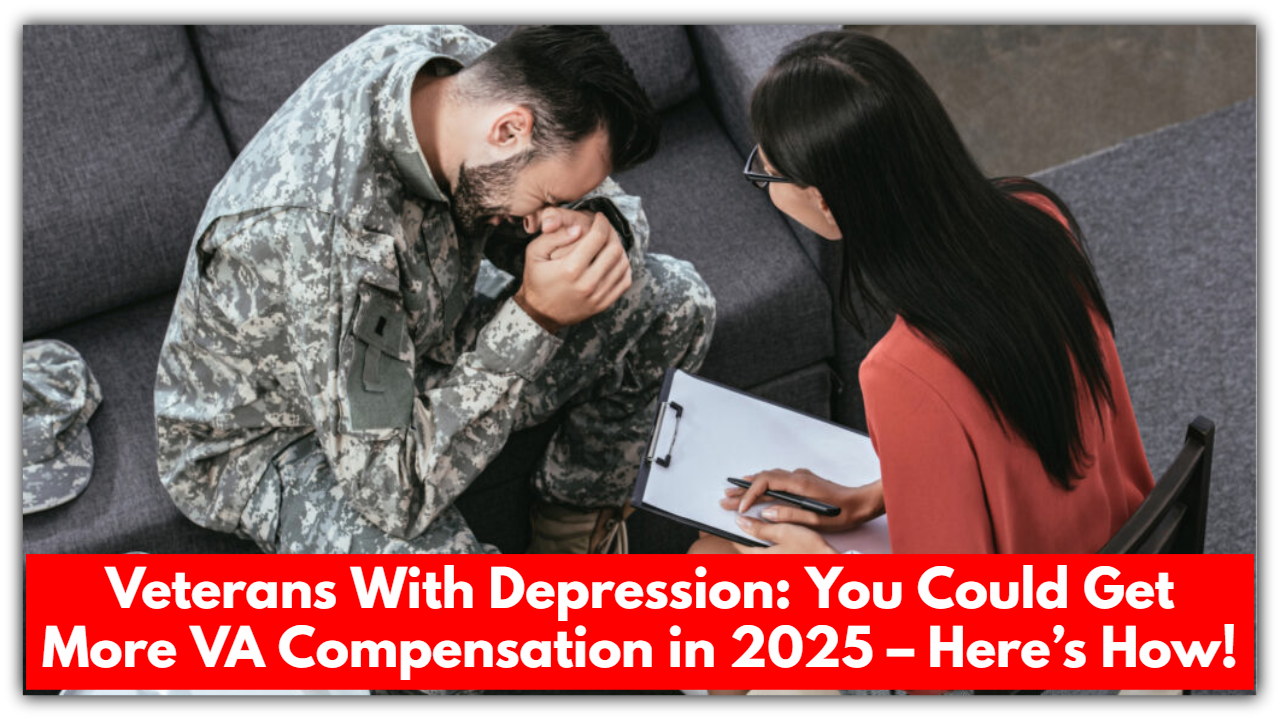Veterans With Depression: You Could Get More VA Compensation in 2025 – Here’s How!
If you’re a veteran dealing with depression or anxiety, you’re not alone—and thankfully, the VA is finally making some changes in 2025 to better recognize mental health challenges. But we get it—figuring out your disability rating can be confusing, frustrating, and just plain overwhelming.
Let’s make it simple and walk through what’s happening, how the VA decides your rating, and what it actually means for your life and monthly check.
What’s a VA Disability Rating, Anyway?
A VA disability rating is a percentage that reflects how much a service-connected condition (like depression or anxiety) affects your ability to work and live your life. That percentage directly determines how much monthly compensation you’ll receive.
For mental health conditions like major depressive disorder and generalized anxiety disorder, the VA uses a six-step scale:
0%, 10%, 30%, 50%, 70%, and 100%.
Each level reflects how seriously your symptoms impact things like relationships, work, focus, self-care, and day-to-day functioning.
Breaking Down the Ratings
Here’s what each level generally means:
-
0% – You’ve been diagnosed, but symptoms are minimal and don’t interfere with daily life. No monthly payment at this level.
-
10% – Symptoms are mild. You might have anxiety in stressful situations or trouble sleeping, but you’re still managing most tasks.
-
30% – Now your mental health is noticeably affecting your work and relationships. Panic attacks, depression, or difficulty concentrating show up more often.
-
50% – You’re struggling more. You may miss work, isolate from others, and have trouble focusing or communicating.
-
70% – Life gets hard here. You may have suicidal thoughts, find it hard to keep a job, or have trouble taking care of yourself and your home.
-
100% – This is full disability. You might have memory loss, delusions, be unable to leave the house, or need constant support.
These aren’t just numbers—they’re windows into how deeply mental health issues can affect your life.

What’s Changing in 2025?
This year, the VA is overhauling how it rates mental health disabilities. And for a lot of veterans, these changes are long overdue.
Here are the key updates:
1. No More 0% for Mental Health
If you’ve been diagnosed with a mental health condition, you’ll now get at least a 10% rating—because every case matters, even mild ones.
2. New Focus Areas
The VA will now look at how your condition affects five areas of your life:
-
Your ability to think and focus
-
How you interact with others
-
Your ability to manage everyday tasks
-
How well you navigate and adapt to your surroundings
-
Your capacity for self-care
This approach is more personal and practical—it focuses on real-life effects, not vague clinical checkboxes.
3. Higher Ratings Even If You’re Still Working
In the past, veterans who could hold a job often got stuck with lower ratings. Now, if your symptoms are severe in certain life areas—even if you’re working—you may qualify for a 70% or even 100% rating.
What This Looks Like in Real Life
Take Mike, a Navy veteran. He’s been dealing with anxiety for years—constant overthinking, sleepless nights, panic attacks in crowded places. He still holds a part-time job but feels like he’s barely functioning. Before 2025, the VA might’ve said, “You’re working, so your symptoms can’t be that bad.”
But now? The VA looks at how hard he’s working to function. If anxiety is making it difficult for him to care for his kids, concentrate, and maintain relationships, Mike might now qualify for a much higher rating.
How to Prepare or Appeal Your Rating
Whether you’re filing a new claim or appealing a past decision, here are some key tips:
-
Be honest about your symptoms. Don’t sugarcoat anything in your exam or forms. Talk about your worst days.
-
Gather strong documentation. This includes medical records, notes from therapy, and even personal journals.
-
Get statements from people who know you. Letters from your spouse, coworkers, or close friends can provide real insight into how your mental health affects your daily life.
-
Understand the new process. These updates are rolling out in 2025 and could make a big difference for new claims or re-evaluations.
If you’re dealing with depression or anxiety, your rating isn’t just about getting a monthly payment—it’s about being seen, heard, and supported. The VA is starting to recognize that mental health struggles aren’t always visible, but they’re very real.
And the changes coming in 2025 are a step in the right direction—more fairness, more clarity, and hopefully, more justice for the veterans who’ve carried invisible wounds for far too long.
If you’re unsure where to start or need help navigating the paperwork, don’t hesitate to ask. You don’t have to figure this out alone.


Comments are closed, but trackbacks and pingbacks are open.